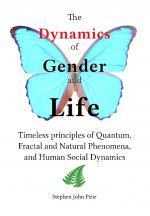This proof, based on the assumptions of modern science and medicine, reveals how we are unable to move our bodies even for the simplest of tasks, such as blinking an eye, or lifting a finger. In view of our easy ability to blink, or move a finger, we may confidently conclude that standard scientific theories -- reliant on the assumption of 'perfectly contiguous and continuous' movement -- are inappropriate and incorrect at the micro-scaled dimensions of space-time, but approximately correct in the macro-scaled events of everyday life1.
This proof focuses on the issue of first-cause. What enables or makes us think, e.g. about thinking? The brain-as-computer analogy has serious shortcomings, chief of which is the inability to explain the impetus to think: before we think, what must we do? Less well known, but even more telling is the inability of brain-as-computer metaphors to accommodate and explain how the computer model operates in the quantum realm involving fields of pre-physical (nonlocal) potentials and possibilities; realms within which all brain 'stuff' is bathed.
As Freeman Dyson explained:
Quantum mechanics makes matter even in the smallest pieces into an active agent, and I think that is something very fundamental. Every particle in the universe is an active agent making choices between random processes.2
What enables particles of our brain-stuff to make choices between random processes that can't be physically predicted or modelled
- A person chooses to begin walking. Neurons fire in his/her head, thus initiating electrical pulses sufficient to cause the relevant muscles to work the process of physical movement.
- Prior to the first signal being sent, a neuron is required to fire (note, see Scientific Assumptions identified earlier).
- Prior to this first neuron firing, sufficient electrical charge (potential difference) must be accumulated in order to fire the neuron - for the signal to leap the synapse.
- However, the building of electrical potential cannot be caused by the choice of walking itself, as it is the first neuron ("thought") in the chain of electrical signals sent to the muscles.
- Since, according to the Scientific Assumptions (see above), all physical movement originates with neurological activity (firing of neurons), there cannot be a neurological "first thought" associated with the choice to walk, as there is no cause of the building of electrical potential sufficient to enable the required neurological processes of "thinking", and the subsequent experience of walking.3
- Ipso facto, physical movement, based on the identified Scientific Assumptions as defined, is impossible.
- 1. Please note that this sentence "In view of our easy ability ..." was originally absent, but is now included as a verbatim, "copy and paste" of the first proof, due to someone on a forum questioning how I could argue that blinking an eye, or lifting a finger was a difficulty.
- 2. Norman Friedman, Bridging Science and Spirit, Living Lake Books, St. Louis 1994. p. 27 {quoting Freeman Dyson, "Theology and the Origins of LIfe," lecture and discussion at the Center for Theology and the Natural Sciences, Berkeley, California, November 1982, p.8.}
- 3. In any event, the wave-functions that provide the range of possibilities and probabilities for behaviour of quanta, is not directly physical. What reaches into those 'waves' to collapse possibility and potential into the experienced thoughts?
 "The Dynamics of Gender and Life" ebook is now available at
"The Dynamics of Gender and Life" ebook is now available at